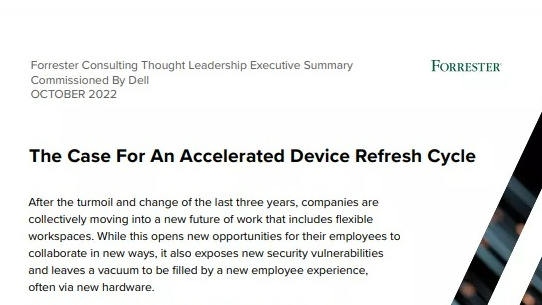Collaboration culture is powering Scottish tech
The Scottish tech sector has bucked UK investment trends as it leans on a massive network of partnerships to build for future growth


Scotland has a rich history of innovation. Playing a key role in Britain’s industrial revolution, its cities fuelled a range of key industries, from textiles and manufacturing to shipbuilding and finance.
In recent years, Scotland has cast off the spectre of the Silicon Glen failure. At its peak, three-in-ten personal computers in Europe were built in Scottish factories, but when the dot-com bubble burst, so too did Scotland’s electronics manufacturing heyday. Since then, Scotland has established a firm reputation as a thriving technology hub. The country now boasts a burgeoning tech ecosystem populated by a plethora of dynamic startups spanning areas such as FinTech, cyber security, MedTech and data science.
More than 850 high-growth tech companies operate in Scotland, as of last year, according to Beahurst. The majority of these are based in Edinburgh, but that isn’t to say the city is the epicentre of the Scottish tech ecosystem.
Glasgow, with its rich industrial heritage, is fast becoming an ideal destination, with firms such as JP Morgan and Barclays establishing tech hubs in the city. Last year, Glasgow-based firms raised a combined £100 million in venture capital investment, more than double raised in 2020. Aberdeen, meanwhile, continues to draw on its traditional strengths in energy as the industry looks to transform its digital capabilities, prepare for the energy transition and capitalise on the renewables boom.
Collaboration is boosting Scottish FinTech
Key to Scottish tech's ongoing success is its well-established culture of collaboration, which appears finely woven into the fabric of the ecosystem. Industry, government, and academia are all intricately linked – with the latter providing a vital talent pipeline fuelling the growing demand of the former. This is a similar framework to that which is powering Northern Ireland's cyber security scene.
Scotland’s academic institutions also do more than just supply talent for the tech sector, however. Increasingly, they provide a nurturing environment for founders and entrepreneurs to build new companies. Figures from the University of Edinburgh’s commercialisation service, for example, revealed 100 startups spun out between September 2021 and 2022 – marking a significant increase against previous years.
The collaborative mindset embedded within the Scottish tech ecosystem is perhaps best exemplified by the FinTech sector, which has grown rapidly over the last five years. Recent figures from FinTech Scotland – the cluster organisation which represents the sector – show Scottish FinTech SMBs raised more than £305 million in funding across 2022. This is in addition to a 13% year-on-year increase in the number of SMBs. Much of the investment here focused on SMBs specialising in payment and data innovation, regulatory technology and wealth management solutions.
Get the ITPro daily newsletter
Sign up today and you will receive a free copy of our Future Focus 2025 report - the leading guidance on AI, cybersecurity and other IT challenges as per 700+ senior executives
Underpinning this growth is the sector’s close relationship with Scotland’s financial services sector, which hosts the second-largest cluster in the UK behind London and is home to organisations such as NatWest Group, JP Morgan, Barclays, and Lloyds Banking Group.
This direct link to financial services incumbents has enabled both industries to draw on combined strengths and provide tangible benefits to consumers and businesses alike, Nicola Anderson, FinTech Scotland CEO, tells IT Pro.

Glasgow-based firms raised a combined £100 million last year
“The majority of FinTechs [in Scotland] are building B2B propositions,” she says. “And so, building on the experience of financial services, their route to market is through those incumbents. It’s a big focus for us at FinTech Scotland; bringing the incumbents and the innovators closer together. The culture within those large organisations to want to develop partnerships is certainly progressing, and that’s helping startups.”
“Innovation calls” – whereby incumbents engage with the FinTech ecosystem to form partnerships and develop new product – also play a key role in cementing this relationship and culture of shared expertise, Anderson adds. Last year, Lloyds, Phoenix Group and TSB all ran innovation calls to work alongside FinTech entrepreneurs and startups operating in the ecosystem – and this has proven highly beneficial.
InBest, for example, partnered with NatWest to develop a cost of living tool that lets customers track spending. Similarly, payments platform BR-DGE recently announced a partnership with Visa to provide payment solutions using the firm's services.
“That’s one example of the type of culture that’s starting to emerge in Scottish FinTech,” Anderson says. “There’s a real transparency [from financial services incumbents] over the kind of challenges they’re facing, and there’s a real appetite to create opportunities for young businesses.”
Techscalers are bringing people together
While recent successes are worth highlighting, the Scottish tech sector has experienced acute challenges – and two recurring themes have traditionally been accessing venture capital investment and talent retention.
Lack of investment is an issue that has permeated virtually every vertical within the Scottish tech sector. So much so that it was identified as a key hurdle for future industry success in the Scottish Technology Ecosystem Review, authored by former Skyscanner executive Mark Logan.
This is where the Scottish Government comes in. Acting on recommendations outlined in the Logan Review, Holyrood has embarked on an ambitious campaign to further develop the infrastructure underpinning Scottish tech.
A £42 million investment in a series of ‘Techscaler Hubs’ – incubators aimed at nurturing early-stage startups and small businesses – is a key part of this push. Logan believes the scheme provides a great opportunity for industry and government to collaborate to support growth and achieve shared long-term goals.
RELATED RESOURCE

ESG: Designing the ideal digital work experience for the next generation of innovators
What users want, why it's critical to give it to them, and how the whole organisation can benefit
“It’s a statement of intent about the level of collaboration that people recognise is required to build a strong tech sector in Scotland that can adapt to the changing world we find ourselves in," he tells IT Pro. “It really needs education, government, and it needs the industry to share the same view and vision of what we’re trying to achieve and make mutually reinforcing interventions into the ecosystem that strengthen each other's activities.”
Crucially, Logan explains, this is about creating a more integrated and aligned tech ecosystem which lets businesses flourish by drawing on shared expertise and industry best-practice from ecosystems elsewhere. In previous years, Logan says this level of integration simply hasn’t been there for founders and startups operating in the sector, with different stakeholders making different but well-intentioned interventions across the ecosystem. Although this has gradually improved, the Techscalers could prove vital to accelerate this process and help Scottish tech reach its ‘tipping point’.

The Scottish Government has bid to improve tech infrastructure by commissioning the Logan Review
"Because we weren’t viewing it as a ‘system’ with inputs and outputs that we should be optimising for, and mechanisms that we can improve, it was harder to talk with the same terminology or discuss how we could reinforce each other’s activities," he adds. “Whereas now we have essentially a shared model of how that system broadly works, and what interventions are viable to increase the output.”
In this context, Logan says, the ‘output’ of Scottish tech is the number of companies that naturally scale, increasing the rate, and shortening the time it takes to get there. It's a problem that’s been discussed at length in the ecosystem, and one inexorably linked to the lingering issue of investment. Logan is keen to emphasise “not every company in Scotland should become a unicorn”, but every company should at least be able to reach the same natural scaling stage as it might have done in a larger, more mature ecosystem.
Stephen Coleman OBE, co-founder of CodeBase, echoes Logan’s comments on the Scottish Government’s commitment to supporting the tech sector, adding the hubs will create an open environment where founders and entrepreneurs can innovate at their own pace.
“The £42 million investment in the Techscaler programme, and the programme’s designation as a primary strategic goal, evidence not only the Scottish Government’s support for the industry, but an ongoing commitment to the tech startup community,” he says. “Education, community, mentorship, and workspace are the key support pillars of Techscaler. Together, they create the environment and conditions for founders and would-be founders to scale.
Members can access educational playbooks and resources, and enrol in courses, he continues. Seven hubs across Scotland provide flexible physical space for members to meet and work together, while an online community offers an accessible space for people in startups to share knowledge, collaborate on ideas, and gather around challenges. Long-term, Coleman suggests these hubs will adapt to the changing needs of the tech community and create greater alignment between industry and government
“Listening to members, recognising and accommodating different needs, and gathering community feedback is central to how CodeBase delivers the programme,” he adds. “This creates an inclusive, nurturing environment, and allows for a data-led approach, helping us uncover what interventions and programmes are most effective for startups at each stage of the journey.”
Uncovering fresh investment opportunities
Although Scotland has traditionally struggled to attract levels of investment comparable to other regional ecosystems in the UK, funding levels have steadily improved. KPMG research reveals high-growth Scottish scale-ups raised an impressive £705 million in venture capital across 2022 – eclipsing the previous record of £626 million in 2021. Bucking both global and UK-wide investment trends, these businesses also continued to perform despite economic disruption in the wake of COVID-19 and the cost of living crisis.
This performance should be acknowledged as a highly positive step for Scotland's tech sector given the circumstances, says Amy Burnett, KPMG’s senior manager for private investment in Scotland.
“Whilst we all love a hockey stick [graph] there are going to be bumps in the road, and we’ve all been impacted last year by the cost of living crisis, what’s happening with Ukraine and the shift in consumer spending,” Burnett says. “I think we’ve got to be mindful of that overall. However, Scotland has done okay up until Q3. Yes, investment cooled over the summer. And yes, we see it being cooler in Q4. But overall, we think it’s actually going to be quite a positive year for Scotland.”
RELATED RESOURCE

What 2023 will mean for the industry
What do most IT decision makers really think will be the important trends and challenges in the coming year?
Notably, Burnett says recent VC activity in Scotland – both from internal and external stakeholders – showcases the fact the industry is becoming an increasingly attractive proposition. It will also act to widen the range of funding options available for startups and scale-ups, she says. In recent years, Scotland has performed well with regard to angel investment and seed funding. Although, as the Logan Review highlights, options for Series A funding and beyond have proven difficult, Burnett reveals KPMG has observed a broader spread of funding options.
“It’s getting better. It’s still not great, but we’ve got a small community of VCs up here which is brilliant. But we know there’s a lot of dry powder out there that’s not being deployed – or could be deployed,” she says. “And that’s not just in Scotland, but across regions to support growth there. I’m excited to see the impact Techscalers makes for our Scottish scale-ups, by creating really brilliant, investible companies.”
Scottish startups are fighting for skills
Looking ahead, talent is expected to be a key challenge amidst an increasingly competitive landscape. This was another notable hurdle identified in the Logan Review, which the government has sought to remedy.
Logan says a key objective in addressing this problem will be to put in place a programme that puts computer science on par with maths, or the school curriculum. "If you put this in a systems context and say if we want to have more tech companies in the future, then we’ve got to make sure we’re seeding the talent pool now,” he says.
While government support is welcomed and could address long-term challenges, in the immediate future this might not be enough to plug critical talent gaps, according to CodeClan chief executive Loral Quinn. Quinn believes training organisations will play a crucial role in bringing talent into the tech ecosystem and help close gaps in key areas. CodeClan is Scotland’s first SQA accredited digital skills academy, and to date has helped hundreds of people upskill and re-skill to pursue careers in the industry.
“In Scotland, we’ve seen some positive movement regarding new talent coming into the industry, but growth across the tech sector has meant that supply still falls significantly short of demand,” Quinn says. “Around 13,000 digital technology jobs are created in Scotland every year, and there continues to be a gap between the number of job opportunities and the number of college and university leavers, apprentices and career changers that enter the market with relevant skills."
Quinn admits that medium and long-term policies “are essential” to inspire young people to take up computer science in schools, colleges and universities. However, lingering short-term challenges also need to be tackled with intensity. “The infrastructure is here,” she says. “What’s needed now is investment and scale to give us the reach we need to drive a talent pipeline that’s diverse enough for our needs.”

Ross Kelly is ITPro's News & Analysis Editor, responsible for leading the brand's news output and in-depth reporting on the latest stories from across the business technology landscape. Ross was previously a Staff Writer, during which time he developed a keen interest in cyber security, business leadership, and emerging technologies.
He graduated from Edinburgh Napier University in 2016 with a BA (Hons) in Journalism, and joined ITPro in 2022 after four years working in technology conference research.
For news pitches, you can contact Ross at ross.kelly@futurenet.com, or on Twitter and LinkedIn.
-
 Westcon-Comstor and Vectra AI launch brace of new channel initiatives
Westcon-Comstor and Vectra AI launch brace of new channel initiativesNews Westcon-Comstor and Vectra AI have announced the launch of two new channel growth initiatives focused on the managed security service provider (MSSP) space and AWS Marketplace.
By Daniel Todd Published
-
 Third time lucky? Microsoft finally begins roll-out of controversial Recall feature
Third time lucky? Microsoft finally begins roll-out of controversial Recall featureNews The Windows Recall feature has been plagued by setbacks and backlash from security professionals
By Emma Woollacott Published
-
 'Digital hide-and-seek': Workers are wasting hundreds of hours a year sourcing the information they need to carry out their role
'Digital hide-and-seek': Workers are wasting hundreds of hours a year sourcing the information they need to carry out their roleNews Knowledge workers globally are wasting a quarter of their working week tracking down information, new research from Atlassian has revealed.
By George Fitzmaurice Published
-
 Untethered: How CIOs and CISOs are paving the way for the new hybrid workforce
Untethered: How CIOs and CISOs are paving the way for the new hybrid workforceWhitepaper Effective techniques to transition from exposed legacy infrastructure to an effective zero trust strategy
By ITPro Published
-
 Unlocking the power of your digital services
Unlocking the power of your digital servicesSponsored Businesses have invested significant cash into technology since COVID-19, but are they really getting their money's worth?
By ITPro Published
-
 Delivering fast and secure digital experiences for the modern hybrid workforce
Delivering fast and secure digital experiences for the modern hybrid workforceWhitepaper A new approach to digital experience monitoring that can monitor the health of all systems
By ITPro Published
-
 Collaboration is the glue that holds your business together
Collaboration is the glue that holds your business togetherSPONSORED A combination of productivity tools and cloud telephony can enable the best from your workforce
By ITPro Published
-
 The future of work and the forgotten workforce
The future of work and the forgotten workforcewhitepaper How to deploy a mobile-first strategy so no one gets left behind
By ITPro Published
-
 The case for an accelerated device refresh cycle
The case for an accelerated device refresh cycleWhitepaper Achieving a more cost-effective device lifecycle overall
By ITPro Published
-
 Employees are choosing how they work
Employees are choosing how they workWhitepaper And with the right secure digital strategy, this could be a great thing for your business: today and far into the future
By ITPro Published